Close
Log In using Email
Notes
Series Summary
anticipation - noun /an-ti-sə-pā-shən/ - A feeling of excitement about something that is going to happen in the future; the visualization of a future event or state. Paul's visit to Thessalonica is described in Acts 17, but his stay there was short due to the jealousy of the Jewish leaders, who incited a mob. Paul moved on to Corinth, where he wrote a letter back to this church that he loved. Because of their persecution, they were looking forward expectantly to the return of Christ, with expectant anticipation for what the future held. This letter is filled with encouragement and insight about growing in godliness and faith, and how spiritual growth should be motivated by their hope in the ultimate return of Jesus Christ. Although a brief letter, 1 Thessalonians is centered on Paul's message of hope, encouragement, and preparation for the return of Christ. This epistle, one of Paul's earliest letters, addresses a young church facing persecution and uncertainty. Paul commends their faith, love, and endurance, but also exhorts them to grow in holiness and remain steadfast as they await Christ's return. The overarching theme of anticipation provides both a source of comfort and a call to action for believers as they navigate the tension between present challenges and future hope. Paul begins the letter by expressing his gratitude for the Thessalonians’ vibrant faith, love, and hope in the gospel. He reminds them of how the gospel came to them not only in word but in power, and how they became examples to others in their faithfulness. This sets the stage for the theme of anticipation, as their faith points forward to the ultimate hope of Jesus' return. Paul emphasizes that the promise of Christ's return gives meaning to their perseverance and fuels their mission to live as witnesses of God's transformative power. The theme of Christ's return is explicitly addressed in every chapter, culminating in Paul's detailed description of the second coming in chapter 4. His words are encouraging, and issue a call to live as people of the light, avoiding complacency and spiritual lethargy, and to be watchful and self-controlled as we await the Day of the Lord. To do so requires the pursuit of holiness and love in our everyday lives as we look for Christ's return. Anticipation of the second coming is not an excuse for passivity but a motivation for active faith and obedience. Believers are to live with the awareness that their actions have eternal significance, striving to please God in all things. Anticipation. We live with the same sense of expectancy. Paul's letter of 1 Thessalonians challenges and encourages Christians to embrace a forward-looking faith that transforms the present while eagerly awaiting the fulfillment of God’s promises in Christ.Sermon Summary
God deeply desires that His people live lives marked by holiness. In 1 Thessalonians 4:1-12, Paul urges believers to walk in a manner that pleases God, encouraging them to do so “more and more.” Holiness is not a destination we reach once, but a journey of continual growth. As God’s people, we are called to be set apart — reflecting His character in our conduct, attitudes, and relationships. Our sanctification is not merely a personal achievement; it’s a response to God’s transforming work in us. Holiness is not optional for the believer. Paul makes it clear that it is God’s will for His people. Conversion to Christ is not the end — it’s the beginning of a life marked by obedience. God has called us to live pure, upright lives that reflect His nature. To disregard this call, Paul warns, is not just to reject human instruction but to reject God Himself, who gives us His Holy Spirit to empower our obedience. But God’s concern for holiness is not rigid or burdensome — He calls us to excel in it. This means that we’re never done growing. There is always room to go deeper in our commitment to godliness. We are called to pursue excellence in the everyday expressions of our faith. Living holy lives honors God, strengthens the church, and witnesses to the world. In a culture that often values self over sanctity, choosing holiness is both radical and beautiful. We can shine a light for others to see as we strive to live in a way that reflects the character of God — not out of obligation, but out of love.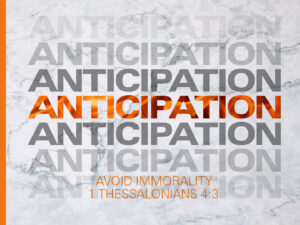
Anticipation: Avoid Immorality

Anticipation: Pursue Holiness
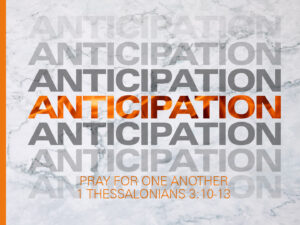
Anticipation: Pray For One Another

Anticipation: Now We Really Live
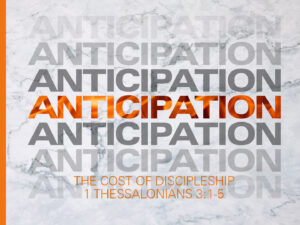
Anticipation: The Cost Of Discipleship
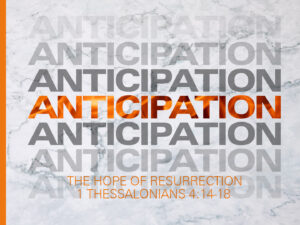
Anticipation: The Hope Of Resurrection
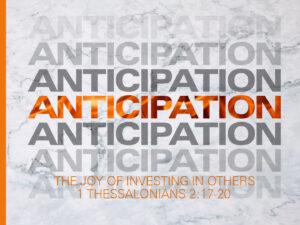
Anticipation: The Joy Of Investing In Others
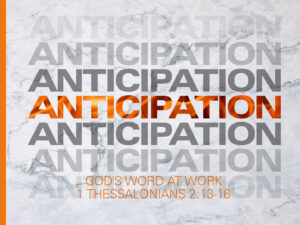
Anticipation: God’s Word At Work

Anticipation: Walk Worthy

Anticipation: How We Love
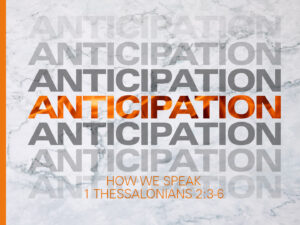
Anticipation: How We Speak
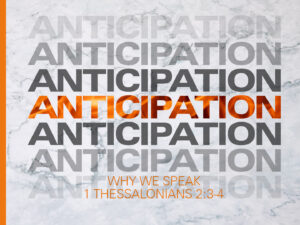
Anticipation: Why We Speak

Anticipation: Speak Boldly

Anticipation: Turning To God
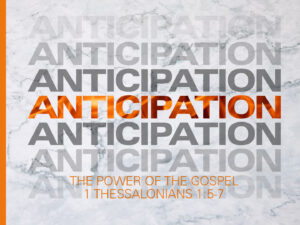
Anticipation: The Power Of The Gospel

Anticipation: Gratitude For The Gospel

Anticipation: Start With Gratitude

